哈佛大学校长就职演说共6页
哈佛校长毕业演说辞
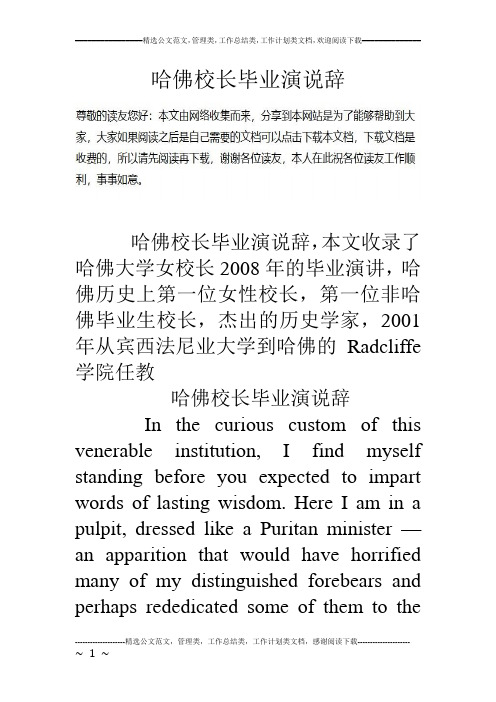
哈佛校长毕业演说辞哈佛校长毕业演说辞,本文收录了哈佛大学女校长2008年的毕业演讲,哈佛历史上第一位女性校长,第一位非哈佛毕业生校长,杰出的历史学家,2001年从宾西法尼业大学到哈佛的Radcliffe 学院任教哈佛校长毕业演说辞In the curious custom of this venerable institution, I find myself standing before you expected to impart words of lasting wisdom. Here I am in a pulpit, dressed like a Puritan minister —an apparition that would have horrified many of my distinguished forebears and perhaps rededicated some of them to theextirpation of witches. This moment would have propelled Increase and Cotton into a true “Mather lather.” But here I am and there you are and it is the moment of and for Veritas.You have been undergraduates for four years. I have been president for not quite one. You have known three presidents; I one senior class. Where then lies the voice of experience? Maybe you should be offering the wisdom. Perhaps our roles could be reversed and I could, in Harvard Law School style, do cold calls for the next hour or so.We all do seem to have made it to this point — more or less in one piece. Though I recently learned that we have not provided you with dinner since May 22. I know we need to wean you from Harvard in a figurative sense. I never knew we took it quite so literally. But let’s return to that notion of cold calls for a moment. Let’simagine this were a baccalaureate service in the form of Q & A, and you were asking the questions. “What is the meaning of life, President Faust? What were these four years at Harvard for? President Faust, you must have learned something since you graduated from college exactly 40 years ago?” (Forty years. I’ll say it out loud since every detail of my life —and certainly the year of my Bryn Mawr degree —now seems to be publicly available. But please remember I was young for my class.)In a way, you have been engaging me in this Q & A for the past year. On just these questions, although you have phrased them a bit more narrowly. And I have been trying to figure out how I might answer and, perhaps more intriguingly, why you were askingLet me explain. It actually began when I met with the UC just after myappointment was announced in the winter of 2007. Then the questions continued when I had lunch at Kirkland House, dinner at Leverett, when I met with students in my office hours, even with some recent graduates I encountered abroad. The first thing you asked me about wasn’t the curriculum or advising or faculty contact or even student space. In fact, it wasn’t even alcohol policy. Instead, you repeatedly asked me: Why are so many of us going to Wall Street? Why are we going in such numbers from Harvard to finance, consulting, i-banking?There are a number of ways to think about this question and how to answer it. There is the Willie Sutton approach. You may know that when he was asked why he robbed banks, he replied, “Because that’s where the money is.” Professors Claudia Goldin and Larry Katz, whom many of you have encountered in your economicsconcentration, offer a not dissimilar answer based on their study of student career choices since the seventies. They find it notable that, given the very high pecuniary rewards in finance, many students nonetheless still choose to do something else. Indeed, 37 of you have signed on with Teach for America; one of you will dance tango and work in dance therapy in Argentina; another will be engaged in agricultural development in Kenya; another, with an honors degree in math, will study poetry; another will train as a pilot with the USAF; another will work to combat breast cancer. Numbers of you will go to law school, medical school, and graduate school. But, consistent with the pattern Goldin and Katz have documented, a considerable number of you areselecting finance and consulting. The Crimson’s survey of last year’s classreported that 58 percent of men and 43 percent of women entering the workforce made this choice. This year, even in challenging economic times, the figure is 39 percent.High salaries, the all but irresistible recruiting juggernaut, the reassurance for many of you that you will be in New York working and living and enjoying life alongside your friends, the promise of interesting work — there are lots of ways to explain these choices. For some of you, it is a commitment for only a year or two in any case. Others believe they will best be able to do good by first doing well. Yet, you ask me why you are following this path. I find myself in some ways less interested in answering your question than in figuring out why you are posing it. If Professors Goldin and Katz have it right; if finance is indeed the “rational choice,” why do you keep raising this issue with me?Why does this seemingly rational choice strike a number of you as not understandable, as not entirely rational, as in some sense less a free choice than a compulsion or necessity? Why does this seem to be troubling so many of you?You are asking me, I think, about the meaning of life, though you have posed your question in code —in terms of the observable and measurable phenomenon of senior career choice rather than the abstract, unfathomable and almost embarrassing realm of metaphysics. The Meaning of Life — capital M, capital L —is a cliché—easier to deal with as the ironic title of a Monty Python movie or the subject of a Simpsons episode than as a matter about which one would dare admit to harboring serious concern.But let’s for a moment abandon our Harvard savoir faire, ourimperturbability, our pretense ofinvulnerability, and try to find the beginnings of some answers to your question.I think you are worried because you want your lives not just to be conventionally successful, but to be meaningful, and you are not sure how those two goals fit together. You are not sure if a generous starting salary at a prestigious brand name organization together with the promise of future wealth will feed your soul.Why are you worried? Partly it is our fault. We have told you from the moment you arrived here that you will be the leaders responsible for the future, that you are the best and the brightest on whom we will all depend, that you will change the world. We have burdened you with no small expectations. And you have already done remarkable things to fulfill them: your dedication to service demonstrated inyour extracurricular engagements, your concern about the future of the planet expressed in your vigorous championing of sustainability, your reinvigoration of American politics through engagement in this year’s presidential contests.But many of you are now wondering how these commitments fit with a career choice. Is it necessary to decide between remunerative work and meaningful work? If it were to be either/or, which would you choose? Is there a way to have both? You are asking me and yourselves fundamental questions about values, about trying to reconcile potentially competing goods, about recognizing that it may not be possible to have it all. You are at a moment of transition that requires making choices. And selecting one option — a job, a career, a graduate program — means not selecting others. Every decision means loss as well as gain — possibilities foregone as well aspossibilities embraced. Your question to me is partly about that —about loss of roads not taken.Finance, Wall Street, “recruiting” have become the symbol of this dilemma, representing a set of issues that is much broader and deeper than just one career path. These are issues that in one way or another will at some point face you all —as you graduate from medical school and choose a specialty —family practice or dermatology, as you decide whether to use your law degree to work for a corporate firm or as a public defender, as you decide whether to stay in teaching after your two years with TFA. You are worried because you want to have both a meaningful life and a successful one; you know you were educated to make a difference not just for yourself, for your own comfort and satisfaction, but for the world around you. And now you have to figure out the way tomake that possible.I think there is a second reason you are worried —related to but not entirely distinct from the first. You want to be happy. You have flocked to courses like “Positive Psychology” —Psych 1504 —and “The Science of Happiness” in search of tips. But how do we find happiness? I can offer one encouraging answer: get older. Turns out that survey data show older people —that is, my age —report themselves happier than do younger ones. But perhaps you don’t want to wait.As I have listened to you talk about the choices ahead of you, I have heard you articulate your worries about the relationship of success andhappiness —perhaps, more accurately, how to define success so that it yields and encompasses real happiness, not just money and prestige. The most remunerative choice, you fear, may not bethe most meaningful and the most satisfying. But you wonder how you would ever survive as an artist or an actor or a public servant or a high school teacher? How would you ever figure out a path by which to make your way in journalism? Would you ever find a job as an English professor after you finished who knows how many years of graduate school and dissertation writing?The answer is: you won’t know till you try. But if you don’t try to do what you love —whether it is painting or biology or finance; if you don’t pursue what you think will be most meaningful, you will regret it. Life is long. There is always time for Plan B. But don’t begin with it.I think of this as my parking space theory of career choice, and I have been sharing it with students for decades. Don’t park 20 blocks from your destinationbecause you think you’ll never find a space. Go where you want to be and then circle back to where you have to be. You may love investment banking or finance or consulting. It might be just right for you. Or, you might be like the senior I met at lunch at Kirkland who had just returned from an interview on the West Coast with aprestigious co nsulting firm. “Why am I doing this?” she asked. “I hate flying, I hate hotels, I won’t like this job.” Find work you love. It is hard to be happy if you spend more than half your waking hours doing something you don’t.But what is ultimately most important here is that you are asking the question —not just of me but of yourselves. You are choosing roads and at the same time challenging your own choices. You have a notion of what you want your life to be and you are not sure the road you aretaking is going to get you there. This is the best news. And it is also, I hope, to some degree, our fault. Noticing your life, reflecting upon it, considering how you can live it well, wondering how you can do good: These are perhaps the most valuable things that a liberal arts education has equipped you to do. A liberal education demands that you liveself-consciously. It prepares you to seek and define the meaning inherent in all you do. It has made you an analyst and critic of yourself, a person in this way supremely equipped to take charge of your life and how it unfolds. It is in this sense that the liberal arts are liberal —as in liberare —to free. They empower you with the possibility of exercising agency, of discovering meaning, of making choices. The surest way to have a meaningful, happy life is to commit yourself to striving for it. Don’t settle. Be prepared to changeroutes. Remember the impossible expectations we have of you, and even as you recognize they are impossible, remember how important they are as a lodestar guiding you toward something that matters to you and to the world. The meaning of your life is for you to make.I can’t wait to see how you all turn out. Do come back, from time to time, and let us know.12全文查看。
哈佛大学校长DrewGilpinFaust清华演讲全文

哈佛大学校长Drew Gilpin Faust清华演讲全文尊敬的陈吉宁部长,陈旭书记,尊敬的老师们,同学们,朋友们:今天能够回到清华大学,就我们这个时代最紧迫的问题和大家交流想法,我感到非常荣幸。
我们在本世纪面临的最大挑战是气候变化以及致力于构造一个可持续、宜居住的世界。
今天,海平面上涨威胁着海岸线,日益频繁的旱灾不断改变生态系统,全球碳排放仍在持续增加。
有一句谚语,说种树最好的时机是二十年前,其次就是现在。
我七年前第一次访问清华时,曾和顾校长一起,种下一棵友谊树。
今天,我很高兴能够再次访问这个美丽的校园。
我知道,这里早在清代就是京城的园林名胜。
我也很高兴地看到,清华-哈佛友谊树已经成为我们众多领域的合作关系蓬勃发展的象征。
它比以往任何时候都更清晰地见证着我们的合作为世界创造的无限可能性。
正因为这样,我今天希望花一点时间,来讨论贵我两校这样的大学在应对气候变化的问题上能够发挥的特殊作用。
四个月以前,同样是在北京,习主席和奥巴马总统共同发表了《中美气候变化联合声明》(U.S.-China Joint Announcement on ClimateChange),承诺在未来二十年内限制美中两国温室气体的排放。
这是一项历史性的声明,它为世界最大的两个碳排放国设定了宏伟的目标,同时也标志着习主席和奥巴马总统希望通过它推动其他国家同样的行动。
其实,这两位领导人都是我们的校友:他们一位是清华化学工程和人文专业的毕业生,另一位毕业于哈佛法学院。
七年以前,甚至就在一年以前,我们都很难预见他们能够达成这样的共识。
然而,贵我两校数十年前就已经为它播下了种子。
我们培养了有能力把数月的讨论转化成国际性里程碑的领袖;我们超过二十年的气候分析合作为声明奠定了理论基础。
而这些事情,惟有大学才能做到。
美中联合声明的发表,对两国关系,乃至全世界的发展来说,都是一个重要时刻。
我们自然应该为这一时刻的到来感到欣慰。
中国一直以来为解决复杂的经济与环境问题做出着巨大的努力,这一点非常值得赞赏。
哈佛大学校长2023年开学演讲:你的名字 中英互译

Your Name你的名字Welcome, members of the Harvard College Class of 2027!哈佛大学2027届的同学们,欢迎你们!I am Claudine Gay, and I am your president.我是克劳丁·盖伊,你们的校长。
I am excited to be here and to mark with you the first moments of your official membership in our community.我很高兴在这里,与你们一起见证你们正式成为哈佛成员的重要时刻。
You’ve joined us from across the country and around the world. You’ve lived lives as varied as anyone could imagine, surmounted obstacles and reached goals, and defined part of who you are through intense focus, unceasing effort, and outstanding achievement.你们从全美各地和世界各地来到了这里。
你们精彩的人生超乎任何人的想象;你们克服困难、达成目标;高度的专注、不懈的努力和卓越的成绩让你们在某种程度上塑造了自己。
And now you are here.现在,你们终于来到这里了。
In this space, give yourselves permission to set aside thoughts of the past and designs on the future. Be present in this marvelous theatre. Take in every aspect of this experience. Let your joy and your pride win out.在这里,请你们允许自己把对过去的留恋和对未来的憧憬都先放到一边。
[哈佛校长的演讲]Goodbyeandgoodluckdoc
![[哈佛校长的演讲]Goodbyeandgoodluckdoc](https://img.taocdn.com/s3/m/60123942ba1aa8114531d910.png)
[哈佛校长的演讲]Goodbyeandgoodluck Today, I speak from this podium a final time as your president。
As I depart, I want to thank all of you - students, faculty, alumni and staff - with whom I have been privileged to work over these past years。
Some of us have had our disagreements, but I know that which unites us transcends that which divides us。
今天,我将以校长的身份,最后一次在这个讲台上演讲。
即将离任前,我要感谢诸位学生、教师、校友和员工,而且非常荣幸在过去的5年里能与你们共事。
我们中的一些人意见不尽相同,但是,我知道,我们的共识远远超越分歧。
Some things look different to me than they did five years ago。
The world that today’s Harvard’s graduates are entering is a profoundly different one than the world administrators entered。
在我看来,现在于5年前不同了。
今天的哈佛毕业生正在进入的世界和管理人员当年所进入的世界相比已是大相径庭了。
It is a world where opportunities have never been greater for those who know how to teach children to read,or those who know how to distribute financial risk; never greater for those who understand the cell and thepixel; never greater for those who can master, and navigate between, legal codes, faith traditions,computer platforms, political viewpoints。
哈佛校长毕业演说辞

哈佛校长毕业演说辞哈佛校长毕业演说辞,本文收录了哈佛大学女校长20XX年的毕业演讲,哈佛历史上第一位女性校长,第一位非哈佛毕业生校长,杰出的历史学家,2001年从宾西法尼业大学到哈佛的Radcliffe学院任教哈佛校长毕业演说辞In the curious custom of this venerable institution, I find myself standing before you expected to impart words of lasting wisdom. Here I am in a pulpit, dressed like a Puritan minister ; an apparition that would have horrified many of my distinguished forebears and perhaps rededicated some of them to the extirpation of witches. This moment would have propelled Increase and Cotton into a true Mather lather. But here I am and there you are and it is the moment of and for Veritas.You have been undergraduates for four years. I have been president for not quite one. You have known three presidents; I one senior class. Where then lies the voice of experience? Maybe you should be offering the wisdom. Perhaps our roles could be reversed and I could, in Harvard Law School style, do cold calls for the next hour or so.We all do seem to have made it to this point ; more or less in one piece. Though I recently learned that we have not provided you with dinner since May 22. I know we need to wean you from Harvard in a figurative sense. I never knew we took it quite so literally. But let’s return to that notion of cold calls for a moment. Let’s imagine this were a baccalaureate service in the form of Q & A, and you were asking the questions. What is the meaning of life, President Faust? What were these four years at Harvard for? President Faust, you must have learned something since you graduated from college exactly 40 years ago? (Forty years. I’ll say it out loud since every detail of my life ; and certainly the year of my Bryn Mawr degree ; now seems to be publicly available. But please remember I was young for my class.)In a way, you have been engaging me in this Q & A for the past year. On just these questions, although you have phrased them a bit more narrowly. And I have been trying to figure out how I might answer and, perhaps more intriguingly, why you were askingLet me explain. It actually began when I met with the UC just after my appointment was announced in the winter of 2007. Then the questions continued when I had lunch at Kirkland House, dinner at Leverett, when I met with students in my office hours, even with some recent graduates I encountered abroad. The first thing you asked me about wasn’t the curriculum or advising or faculty contact or even student space. In fact, it wasn’t even alcohol policy. Instead, you repeatedly asked me: Why are so many of us going to Wall Street? Why are we going in such numbers from Harvard to finance, consulting, i-banking?There are a number of ways to think about this question and how to answer it. There is the Willie Sutton approach. You may know that when he was asked why he robbed banks, he replied, Because that’s where the money is. Professors Claudia Goldin and Larry Katz, whom many of you have encountered in your economics concentration, offer a not dissimilar answer based on their study of student career choices since the seventies. They find it notable that, given the very high pecuniary rewards in finance, many students nonetheless still choose to do something else. Indeed, 37 of you have signed on with Teach for America; one of you will dance tango and work in dance therapy in Argentina; another will be engaged in agricultural development in Kenya; another, with an honors degree in math, will study poetry; another will train as a pilot with the USAF; another will work to combat breast cancer. Numbers of you will go to law school, medical school, and graduate school. But, consistent with the pattern Goldin and Katz have documented, a considerable number of you areselecting finance and consulting. The Crimson’s survey of last year’s class reported that 58 percent of men and 43 percent of women entering the workforce made this choice. This year, even in challenging economic times, the figure is 39 percent.High salaries, the all but irresistible recruiting juggernaut, the reassurance for many of you that you will be in New York working and living and enjoying life alongside your friends, the promise of interesting work ; there are lots of ways to explain these choices. For some of you, it is a commitment for only a year or two in any case. Others believe they will best be able to do good by first doing well. Yet, you ask me why you are following this path. I find myself in some ways less interested in answering your question than in figuring out why you are posing it. If Professors Goldin and Katz have it right; if finance is indeed the rational choice, why do you keep raising this issue with me? Why does this seemingly rational choice strike a number of you as not understandable, as not entirely rational, as in some sense less a free choice than a compulsion or necessity? Why does this seem to be troubling so many of you?You are asking me, I think, about the meaning of life, though you have posed your question in code ; in terms of the observable and measurable phenomenon of senior career choice rather than the abstract, unfathomable and almost embarrassing realm of metaphysics.The Meaning of Life ; capital M, capital L ; is a cliché ; easier to deal with as the ironic title of a Monty Python movie or the subject of a Simpsons episode than as a matter about which one would dare admit to harboring serious concern.But let’s for a moment abandon our Harvard savoir faire, ourimperturbability, our pretense of invulnerability, and try to find the beginnings of some answers to your question.I think you are worried because you want your lives not just to be conventionally successful, but to be meaningful, and you are not sure how those two goals fit together. You are not sure if a generous starting salary at a prestigious brand name organization together with the promise of future wealth will feed your soul.Why are you worried? Partly it is our fault. We have told you from the moment you arrived here that you will be the leaders responsible for the future, that you are the best and the brightest on whom we will all depend, that you will change the world. We have burdened you with no small expectations. And you have already done remarkable things to fulfill them: your dedication to service demonstrated in your extracurricular engagements, your concern about the future of the planet expressed in your vigorous championing of sustainability, your reinvigoration of American politics through engagement in this year’s presidential contests.But many of you are now wondering how these commitments fit with a career choice. Is it necessary to decide between remunerative work and meaningful work? If it were to be either/or, which would you choose? Is there a way to have both? You are asking me and yourselves fundamental questions about values, about trying to reconcile potentially competing goods, about recognizing that it may not be possible to have it all. You are at a moment of transition that requires making choices. And selecting one option ; a job, a career, a graduate program ; means not selecting others. Every decision means loss as well as gain ; possibilities foregone as well as possibilities embraced. Your question to me is partly about that ; about loss of roads not taken.Finance, Wall Street, recruiting have become the symbol of this dilemma, representing a set of issues that is much broader and deeper than just one career path. These are issues that in one way or another will at some point face you all ; as you graduate from medical school and choose a specialty ; family practice or dermatology, as you decide whether to use your law degree to work for a corporate firm or as a public defender, as you decide whether to stay in teaching after your two years with TFA. You are worried because youwant to have both a meaningful life and a successful one; you know you were educated to make a difference not just for yourself, for your own comfort and satisfaction, but for the world around you. And now you have to figure out the way to make that possible.I think there is a second reason you are worried ; related to but not entirely distinct from the first. You want to be happy. You have flocked to courses like Positive Psychology ; Psych 1504 ; and The Science of Happiness in search of tips. But how do we find happiness?I can offer one encouraging answer: get older. Turns out that survey data show older people ; that is, my age ; report themselves happier than do younger ones. But perhaps you don’t want to wait.As I have listened to you talk about the choices ahead of you, I have heard you articulate your worries about the relationship of success andhappiness ; perhaps, more accurately, how to define success so that it yields and encompasses real happiness, not just money and prestige. The most remunerative choice, you fear, may not be the most meaningful and the most satisfying. But you wonder how you would ever survive as an artist or an actor or a public servant or a high school teacher? How would you ever figure out a path by which to make your way in journalism? Would you ever find a job as an English professor after you finished who knows how many years of graduate school and dissertation writing?The answer is: you won’t know till you try. But if you don’t try to do what you love ; whether it is painting or biology or finance; if you don’t pursue what you think will be most meaningful, you will regret it. Life is long. There is always time for Plan B. But don’t begin with it.I think of this as my parking space theory of career choice, and I have been sharing it with students for decades. Don’t park 20 blocks from your destination because you think you’ll never find a space. Go where you want to be and then circle back to where you have to be. You may love investment banking or finance or consulting. It might be just right for you. Or, you might be like the senior I met at lunch at Kirkland who had just returned from an interview on the West Coast with aprestigious consulting firm. Why am I doing this? she asked. I hate flying, I hate hotels, I won’t like this job. Find work you love. It is hard to be happy if you spend more than half your waking hours doing something you don’t.But what is ultimately most important here is that you are asking the question ; not just of me but of yourselves. You are choosing roads and at the same time challenging your own choices. You have a notion of what you want your life to be and you are not sure the road you are taking is going to get you there. This is the best news. And it is also, I hope, to some degree, our fault. Noticing your life, reflecting upon it, considering how you can live it well, wondering how you can do good: These are perhaps the most valuable things that a liberal arts education has equipped you to do. A liberal education demands that you liveself-consciously. It prepares you to seek and define the meaning inherent in all you do. It has made you an analyst and critic of yourself, a person in this way supremely equipped to take charge of your life and how it unfolds. It is in this sense that the liberal arts are liberal ; as in liberare ; to free. They empower you with the possibility of exercising agency, of discovering meaning, of making choices. The surest way to have a meaningful, happy life is to commit yourself to striving for it. Don’t settle. Be prepared to change routes. Remember the impossible expectations we have of you, and even as you recognize they are impossible, remember how important they are as a lodestar guiding you toward something that matters to you and to the world. The meaning of your life is for you to make.I can’t wait to see how you all turn out. Do come back, from time to time, and let us know.。
哈福大学校长演讲稿(最新)
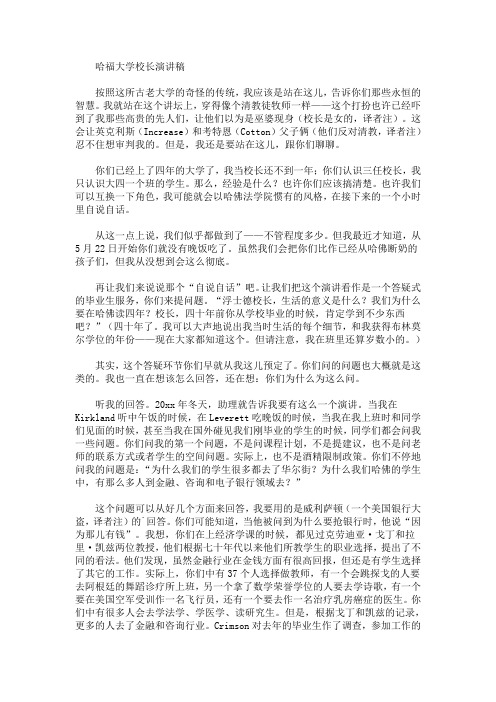
哈福大学校长演讲稿按照这所古老大学的奇怪的传统,我应该是站在这儿,告诉你们那些永恒的智慧。
我就站在这个讲坛上,穿得像个清教徒牧师一样——这个打扮也许已经吓到了我那些高贵的先人们,让他们以为是巫婆现身(校长是女的,译者注)。
这会让英克利斯(Increase)和考特恩(Cotton)父子俩(他们反对清教,译者注)忍不住想审判我的。
但是,我还是要站在这儿,跟你们聊聊。
你们已经上了四年的大学了,我当校长还不到一年;你们认识三任校长,我只认识大四一个班的学生。
那么,经验是什么?也许你们应该搞清楚。
也许我们可以互换一下角色,我可能就会以哈佛法学院惯有的风格,在接下来的一个小时里自说自话。
从这一点上说,我们似乎都做到了——不管程度多少。
但我最近才知道,从5月22日开始你们就没有晚饭吃了。
虽然我们会把你们比作已经从哈佛断奶的孩子们,但我从没想到会这么彻底。
再让我们来说说那个“自说自话”吧。
让我们把这个演讲看作是一个答疑式的毕业生服务,你们来提问题。
“浮士德校长,生活的意义是什么?我们为什么要在哈佛读四年?校长,四十年前你从学校毕业的时候,肯定学到不少东西吧?”(四十年了。
我可以大声地说出我当时生活的每个细节,和我获得布林莫尔学位的年份——现在大家都知道这个。
但请注意,我在班里还算岁数小的。
)其实,这个答疑环节你们早就从我这儿预定了。
你们问的问题也大概就是这类的。
我也一直在想该怎么回答,还在想:你们为什么为这么问。
听我的回答。
20xx年冬天,助理就告诉我要有这么一个演讲。
当我在Kirkland听中午饭的时候,在Leverett吃晚饭的时候,当我在我上班时和同学们见面的时候,甚至当我在国外碰见我们刚毕业的学生的时候,同学们都会问我一些问题。
你们问我的第一个问题,不是问课程计划,不是提建议,也不是问老师的联系方式或者学生的空间问题。
实际上,也不是酒精限制政策。
你们不停地问我的问题是:“为什么我们的学生很多都去了华尔街?为什么我们哈佛的学生中,有那么多人到金融、咨询和电子银行领域去?”这个问题可以从好几个方面来回答,我要用的是威利萨顿(一个美国银行大盗,译者注)的`回答。
哈佛校长的演说.doc
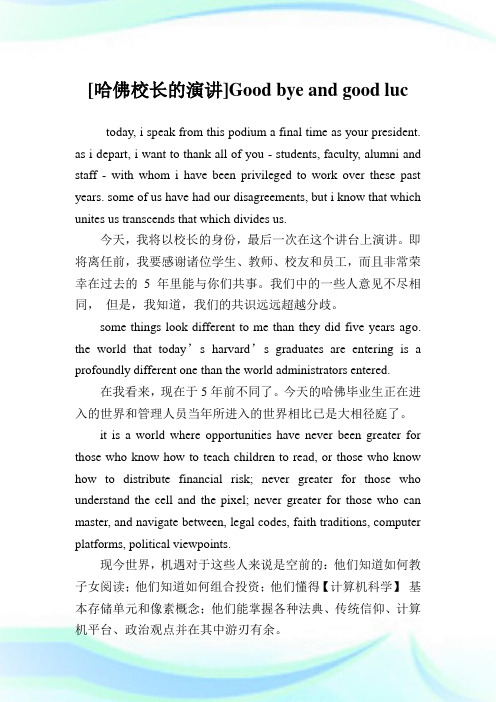
[哈佛校长的演讲]Good bye and good luctoday, i speak from this podium a final time as your president. as i depart, i want to thank all of you - students, faculty, alumni and staff - with whom i have been privileged to work over these past years. some of us have had our disagreements, but i know that which unites us transcends that which divides us.今天,我将以校长的身份,最后一次在这个讲台上演讲。
即将离任前,我要感谢诸位学生、教师、校友和员工,而且非常荣幸在过去的5年里能与你们共事。
我们中的一些人意见不尽相同,但是,我知道,我们的共识远远超越分歧。
some things look different to me than they did five years ago. the world that today’s harvard’s graduates are entering is a profoundly different one than the world administrators entered.在我看来,现在于5年前不同了。
今天的哈佛毕业生正在进入的世界和管理人员当年所进入的世界相比已是大相径庭了。
it is a world where opportunities have never been greater for those who know how to teach children to read, or those who know how to distribute financial risk; never greater for those who understand the cell and the pixel; never greater for those who can master, and navigate between, legal codes, faith traditions, computer platforms, political viewpoints.现今世界,机遇对于这些人来说是空前的:他们知道如何教子女阅读;他们知道如何组合投资;他们懂得【计算机科学】基本存储单元和像素概念;他们能掌握各种法典、传统信仰、计算机平台、政治观点并在其中游刃有余。
哈佛大学校长德鲁福斯特毕业演讲稿
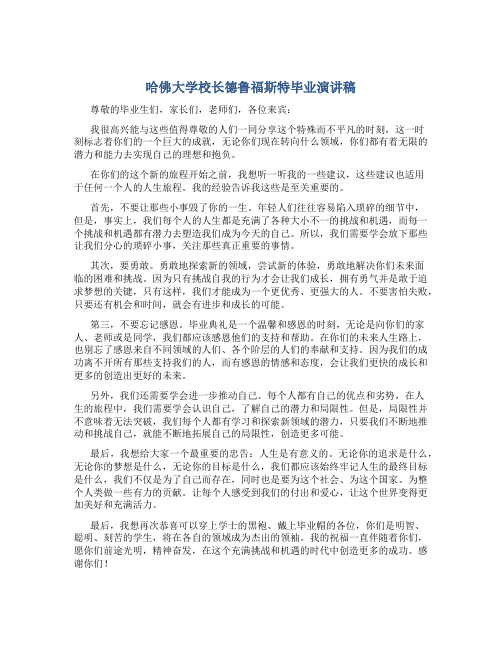
哈佛大学校长德鲁福斯特毕业演讲稿尊敬的毕业生们,家长们,老师们,各位来宾:我很高兴能与这些值得尊敬的人们一同分享这个特殊而不平凡的时刻,这一时刻标志着你们的一个巨大的成就,无论你们现在转向什么领域,你们都有着无限的潜力和能力去实现自己的理想和抱负。
在你们的这个新的旅程开始之前,我想听一听我的一些建议,这些建议也适用于任何一个人的人生旅程。
我的经验告诉我这些是至关重要的。
首先,不要让那些小事毁了你的一生。
年轻人们往往容易陷入琐碎的细节中,但是,事实上,我们每个人的人生都是充满了各种大小不一的挑战和机遇,而每一个挑战和机遇都有潜力去塑造我们成为今天的自己。
所以,我们需要学会放下那些让我们分心的琐碎小事,关注那些真正重要的事情。
其次,要勇敢。
勇敢地探索新的领域,尝试新的体验,勇敢地解决你们未来面临的困难和挑战。
因为只有挑战自我的行为才会让我们成长,拥有勇气并是敢于追求梦想的关键,只有这样,我们才能成为一个更优秀、更强大的人。
不要害怕失败,只要还有机会和时间,就会有进步和成长的可能。
第三,不要忘记感恩。
毕业典礼是一个温馨和感恩的时刻,无论是向你们的家人、老师或是同学,我们都应该感恩他们的支持和帮助。
在你们的未来人生路上,也别忘了感恩来自不同领域的人们、各个阶层的人们的奉献和支持。
因为我们的成功离不开所有那些支持我们的人,而有感恩的情感和态度,会让我们更快的成长和更多的创造出更好的未来。
另外,我们还需要学会进一步推动自己。
每个人都有自己的优点和劣势,在人生的旅程中,我们需要学会认识自己,了解自己的潜力和局限性。
但是,局限性并不意味着无法突破,我们每个人都有学习和探索新领域的潜力,只要我们不断地推动和挑战自己,就能不断地拓展自己的局限性,创造更多可能。
最后,我想给大家一个最重要的忠告:人生是有意义的。
无论你的追求是什么,无论你的梦想是什么,无论你的目标是什么,我们都应该始终牢记人生的最终目标是什么,我们不仅是为了自己而存在,同时也是要为这个社会、为这个国家、为整个人类做一些有力的贡献。
哈佛大学校长就职演说共6页

哈佛大学校长就职演说:放飞我们最富挑战性的想象力2008-04-28-08-59-37 yyb350322- 阅读:216哈佛大学校长德鲁·福斯特郭英剑编译转自:/show.php?id=10889 [译者按:《放飞我们最富挑战性的想象力》是美国哈佛大学第28任校长德鲁·福斯特在2007年10月12日就职典礼上的演讲词。
需要向读者说明的是,这里所谓的“编译”,是指译者删去了——也就是没有翻译——原文中的一些客套话和一些(在译者看来并不太重要的)词句,但不改动原来的句子,也就是说,这里所有的语句,都出自原文,非译者“编辑加工”后再“译”而成。
原文见:Installation address: Unleashing our most ambitious imaginings就职演讲常常会罗列一些新校长的具体构想或是计划。
但是,当我在考虑今天意味着什么的时候,这样的罗列似乎过于束缚人,它们限制了而不是去放飞我们最富挑战性的想象力,限制了我们去思考我们最深远的责任和义务。
如果今天是超越普通日子的一天,如果今天是我们为数不多的、不仅是作为哈佛人聚集在一起、而是与一个更为广阔的学术、教学与学问的世界站在一起的一天,那么,现在就是哈佛以及像哈佛这类大学去思考的时候了:在这21世纪的第一个十年中,我们应该扮演什么样的角色。
大学的确是要承担责任的。
但我们从事高等教育的人需要首先搞清楚,我们为了什么去承担责任。
人们要求我们报告毕业率、研究生院的入学统计数字、标准考试的分数,目的是为了在大学评价中提高“附加值”,人们要看研究经费有多少,教师出版和发表论著的数量是多少。
但这些硬性指标本身并不能说明所取得的成就,更不要提大学所渴望达到的目标了。
虽然了解上述指标很重要,它们也可以说明我们事业中一些特别的部分内容。
但我们的目的要比这些宏大得多,因此,要解释我们的责任感,也更加困难。
那么,让我斗胆提出一个定义来吧。
哈佛校长2021开学演讲:你,终将拥有聪明、富有、强大的人生!
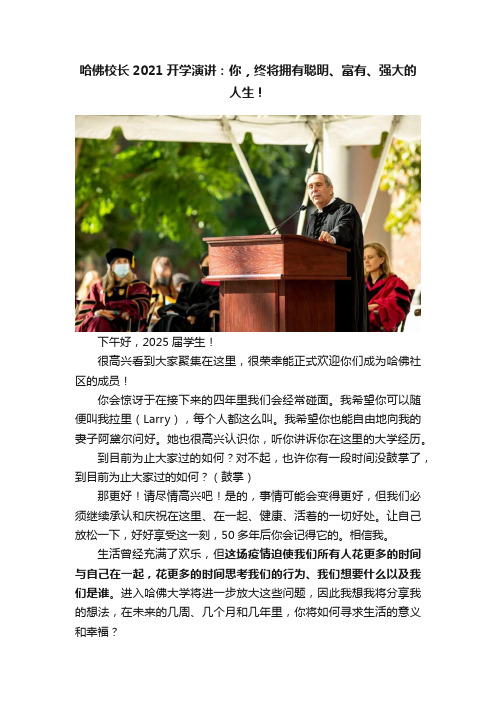
哈佛校长2021开学演讲:你,终将拥有聪明、富有、强大的人生!下午好,2025届学生!很高兴看到大家聚集在这里,很荣幸能正式欢迎你们成为哈佛社区的成员!你会惊讶于在接下来的四年里我们会经常碰面。
我希望你可以随便叫我拉里(Larry),每个人都这么叫。
我希望你也能自由地向我的妻子阿黛尔问好。
她也很高兴认识你,听你讲诉你在这里的大学经历。
到目前为止大家过的如何?对不起,也许你有一段时间没鼓掌了,到目前为止大家过的如何?(鼓掌)那更好!请尽情高兴吧!是的,事情可能会变得更好,但我们必须继续承认和庆祝在这里、在一起、健康、活着的一切好处。
让自己放松一下,好好享受这一刻,50多年后你会记得它的。
相信我。
生活曾经充满了欢乐,但这场疫情迫使我们所有人花更多的时间与自己在一起,花更多的时间思考我们的行为、我们想要什么以及我们是谁。
进入哈佛大学将进一步放大这些问题,因此我想我将分享我的想法,在未来的几周、几个月和几年里,你将如何寻求生活的意义和幸福?关于这个话题有很多书,Tiktok上至少有10亿视频,但我读过的最好的建议来自一个古老的地方——犹太传统中的神圣文本《塔木德》(Talmud)。
在《我们父亲的道德》一书中,本·佐马向各个时代提出了三个问题:谁是聪明的人?谁是强大的人?谁是富有的人?谁是聪明的人?《塔木德》回答说,“向所有人学习的人。
”在离你远一点的座位——离你远一排的座位,是一个对事物的看法与你截然不同的人,一个坚持与你自己观点不一致的有信念的人。
当你遇到那个人时,你的第一个冲动可能是大声而清晰地表明你的观点。
试着抵制这种冲动,倾听、提问、及时对话,而不是冲突。
如果你背着那些不同意你观点的人离开这个地方,你将无法利用哈佛大学最大的优势之一——我们社区的多样性和活力。
永远不要忘记:我们从我们的差异中学习。
谁是强大的人?《塔木德》回答说:“能够自我控制的人。
”接种疫苗并不等于无敌。
你每天与之互动的人可能会回到家中,与那些还没有资格接种疫苗或在感染病毒时有特殊并发症风险的家庭成员见面。
哈佛大学校长德鲁·福斯特英文演讲稿:推动积极的变革和成长
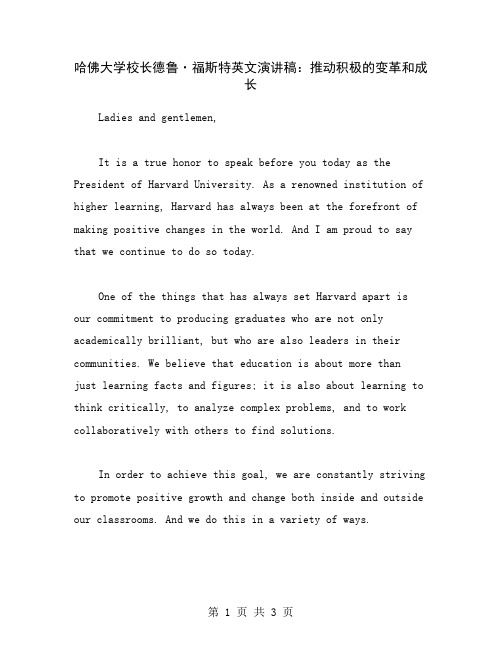
哈佛大学校长德鲁·福斯特英文演讲稿:推动积极的变革和成长Ladies and gentlemen,It is a true honor to speak before you today as the President of Harvard University. As a renowned institution of higher learning, Harvard has always been at the forefront of making positive changes in the world. And I am proud to say that we continue to do so today.One of the things that has always set Harvard apart is our commitment to producing graduates who are not only academically brilliant, but who are also leaders in their communities. We believe that education is about more thanjust learning facts and figures; it is also about learning to think critically, to analyze complex problems, and to work collaboratively with others to find solutions.In order to achieve this goal, we are constantly striving to promote positive growth and change both inside and outside our classrooms. And we do this in a variety of ways.First, we encourage our faculty to stay up-to-date withthe latest research and teaching methodologies. By providing them with the tools and resources they need to succeed, we empower them to provide the best possible education to our students.Second, we promote a culture of innovation and creativity. We encourage our students to think outside the box and totake risks in pursuit of their goals. We want them to be bold, to be curious, and to embrace failure as an essential part of the learning process.Third, we place a strong emphasis on diversity and inclusion. We believe that having a diverse student body and faculty is essential to creating a stimulating andintellectually challenging learning environment. By fostering a culture of inclusivity, we encourage students from all backgrounds to thrive and succeed.But our commitment to positive change and growth extends beyond the walls of our campus. We are also deeply committedto making a positive impact on the world.For example, we have established a number of programs and initiatives that are designed to address some of the most pressing issues facing society today. These include programs to promote environmental sustainability, to improve access to healthcare in developing countries, and to promote peace and reconciliation in conflict zones around the world.In addition, we are constantly seeking to collaborate with other institutions and organizations to tackle these issues in a coordinated and effective way. We believe that by working together, we can achieve far more than we could ever hope to on our own.So as you can see, our commitment to positive change and growth extends far beyond our campus. We are constantly looking for ways to make a positive impact on the world, and to help our students become the leaders and innovators of tomorrow.Thank you.。
哈佛大学校长德鲁·福斯特英语演讲稿:建立未来的意识和行动
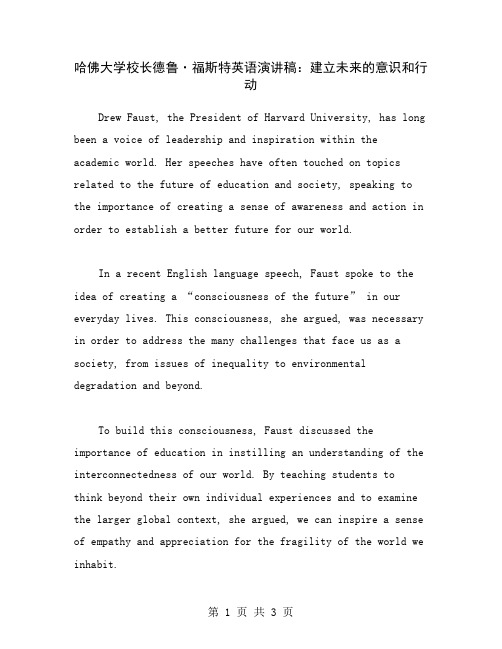
哈佛大学校长德鲁·福斯特英语演讲稿:建立未来的意识和行动Drew Faust, the President of Harvard University, has long been a voice of leadership and inspiration within the academic world. Her speeches have often touched on topics related to the future of education and society, speaking to the importance of creating a sense of awareness and action in order to establish a better future for our world.In a recent English language speech, Faust spoke to the idea of creating a “consciousness of the future” in our everyday lives. This consciousness, she argued, was necessary in order to address the many challenges that face us as a society, from issues of inequality to environmental degradation and beyond.To build this consciousness, Faust discussed the importance of education in instilling an understanding of the interconnectedness of our world. By teaching students tothink beyond their own individual experiences and to examine the larger global context, she argued, we can inspire a sense of empathy and appreciation for the fragility of the world we inhabit.Beyond education, Faust also encouraged individuals to take action in their own lives. She spoke to the importance of small, everyday choices, from deciding to recycle to making more sustainable choices as consumers. Through these small acts of commitment, she argued, we can collectively begin to shift the trajectory of our society towards a more positive future.Faust also spoke to the importance of collective action, highlighting the power of movements such as the recent global climate strikes as evidence of the potential for widespread mobilization. When individuals come together with a shared vision for the future, she argued, they can act as a powerful force for positive change.Finally, Faust emphasized the need for leadership in establishing a consciousness of the future. She spoke to the importance of public figures and those in positions of power to use their platforms to promote awareness and action, highlighting the role of Harvard as a leading institution in shaping a more sustainable and progressive future for our world.In closing, Faust encouraged her audience to embrace the challenge of creating a consciousness of the future, recognizing that the path towards a better world is a collective and ongoing journey. Through education, individual action, collective mobilization, and leadership, she argued, we can build a brighter and more sustainable future for generations to come.。
扎克伯格哈佛演讲稿中英文

扎克伯格哈佛演讲稿中英文英文原文:President Faust, Board of Overseers, faculty, alumni, friends, proud parents, members of the ad board, and graduates of the greatest university in the world, I'm honored to be with you today because, let's face it, you accomplished something I never could. If I get through this speech, it'll be the first time I actually finish something at Harvard. Class of 2017, congratulations!I'm an unlikely speaker, not just because I dropped out, but because we're technically in the same generation. We walked this yard less than a decade apart, studied the same ideas and slept through the same Ec10 lectures. We may have taken different paths to get here, especially if you came all the way from the Quad, but today I want to share what I've learned about our generation and the world we're building together.But first, the last couple of days have brought back a lot of good memories. How many of you remember exactly what you were doing when you got that email telling you that you got into Harvard? I was playing Civilization and I ran downstairs, got my dad, and for some reason, his reaction was to video me opening the email. That could have been a really sad video. I swear, getting into Harvard is still the thing my parents are most proud of me for.What about your first lecture at Harvard? Mine was Computer Science 121 with the incredible Harry Lewis. I was late, so I threw on a t-shirt and didn't realize until afterwards it was inside out and backwards with my tag sticking out the front. I couldn't figure out why no one would talk to me — except one guy, KX Jin, he just went with it. We ended up doing our problem sets together, and now he runs a big part of Facebook. And that, Class of 2017, is why you should be nice to people.But my best memory from Harvard was meeting Priscilla. I had just launched this prank website Facemash, and the ad board wanted to "see me." Everyone thought I was going to get kicked out. My parents came to help me pack. My friends threw me a going away party. As luck would have it, Priscilla was at that party with her friend. We met in line for the bathroom in the Pfoho Belltower, and in what must be one of the all-time romantic lines, I said: "I'm going to get kicked out in three days, so we need to go on adate quickly."Actually, any of you graduating can use that line.Today I want to talk about three ways to create a world where everyone has a sense of purpose: by taking on big meaningful projects together, by redefining equality so everyone has the freedom to pursue purpose and by building community across the world.First, let's take on big meaningful projects. Our generation will have to deal with tens of millions of jobs replaced by automation like self-driving cars and trucks. But we have the potential to do so much more together. Every generation has its defining works. More than 300,000 people worked to put a man on the moon – including that janitor. Millions of volunteers immunized children around the world against polio. Millions of more people built the Hoover dam and other great projects.These projects didn't just provide purpose for the people doing those jobs, they gave our whole country a sense of pride that we could do great things.Now it's our turn to do great things. I know, you're probably thinking: I don't know how to build a dam, or get a million people involved in anything.But let me tell you a secret: no one does when they begin. Ideas don't come out fully formed. They only become clear as you work on them. You just have to get started.If I had to understand everything about connecting people before I began, I never would have started Facebook.Movies and pop culture get this all wrong. The idea of a single eureka moment is a dangerous lie. It makes us feel inadequate since we haven't had ours. It prevents people with seeds of good ideas from getting started. Oh, you know what else movies get wrong about innovation? No one writes math formulas on glass. That's not a thing.It's good to be idealistic. But be prepared to be misunderstood. Anyone working on a big vision will get called crazy, even if you end up right. Anyone working on a complex problem will get blamed for not fully understanding the challenge, even though it's impossible to know everything upfront. Anyone taking initiative will get criticized for moving too fast, because there's always someone who wants to slow you down.But if you know what you're sure about, if you know what you want to build, then you must be bold and be committed to it. You'll make mistakes. It's tough, but it's a part of being bold. You'll make mistakes, but you'll learn from them, and that's the best way to build something great.中文翻译:福斯特校长、监事会成员、老师、校友、朋友们、自豪的家长们、管理委员会的委员们,以及全世界最伟大学校的毕业生们,今天和你们在一起我感到非常荣幸,因为,说实话,你们完成了一个我永远无法完成的成就。
哈佛大学校长告别词
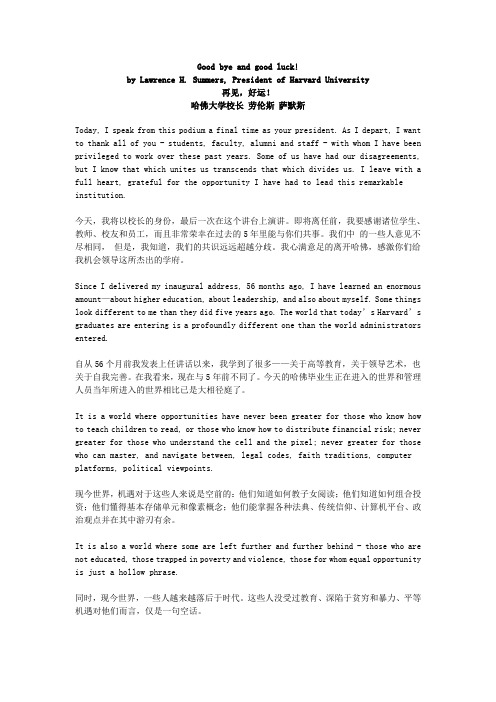
Good bye and good luck!by Lawrence H. Summers, President of Harvard University再见,好运!哈佛大学校长劳伦斯萨默斯Today, I speak from this podium a final time as your president. As I depart, I want to thank all of you - students, faculty, alumni and staff - with whom I have been privileged to work over these past years. Some of us have had our disagreements, but I know that which unites us transcends that which divides us. I leave with a full heart, grateful for the opportunity I have had to lead this remarkable institution.今天,我将以校长的身份,最后一次在这个讲台上演讲。
即将离任前,我要感谢诸位学生、教师、校友和员工,而且非常荣幸在过去的5年里能与你们共事。
我们中的一些人意见不尽相同,但是,我知道,我们的共识远远超越分歧。
我心满意足的离开哈佛,感激你们给我机会领导这所杰出的学府。
Since I delivered my inaugural address, 56 months ago, I have learned an enormous amount—about higher education, about leadership, and also about myself. Some things look different to me than they did five years ago. The world that today’s Harvard’s graduates are entering is a profoundly different one than the world administrators entered.自从56个月前我发表上任讲话以来,我学到了很多——关于高等教育,关于领导艺术,也关于自我完善。
哈佛大学校长德鲁福斯特2015年毕业演讲稿(小编整理)

哈佛大学校长德鲁福斯特2015年毕业演讲稿(小编整理)第一篇:哈佛大学校长德鲁福斯特2015年毕业演讲稿哈佛大学校长德鲁福斯特在2015年哈佛毕业典礼上,为毕业生送上演讲《这是一个自拍的时代》,说当代社会是一个自拍,自拍杆的时代,对于我们,我们应该自己主动承担责任,成为国家有益的人,下面是这篇哈佛大学校长德鲁福斯特2015年毕业演讲稿哈佛大学校长德鲁福斯特2015年毕业演讲稿当我们的开国先辈于1630年来到马塞诸塞州的这片海岸时,他们是作为持异见者而来的他们摒弃了家乡英国的体制。
但是一直令我惊奇的是,在当时的这片荒地里,在如何生存下去还是个未解的问题之时,这些开国先辈很快就意识到了建立(哈佛大学)这所高等学府的必要性。
自此以后,一代代人来了又去,哈佛的校园也不断扩大,不再局限于当年的几间小木楼。
但没有变的是,每一代人都充满信心,想要建立更好的社会,每一代人也都相信,这所大学将使这种愿望成为可能。
正如一位早期创始人thomas shepard 所说,我们希望毕业生走向世界之后,能够成长为对国家有益之人。
而如今,将近四个世纪后,我们发现我们处在一个充满挑战的历史时刻。
我们应如何鼓励我们的毕业生去做对他人有益之事?我们是否培养出了以造福他人为目的的毕业生?还是,我们所有人都已变得对个人成就、机遇和形象如此痴狂,以至于忘记了我们的互相依赖,忘记了我们对于彼此和对于这所旨在促进公共利益的大学的责任?这是一个自拍还有自拍杆的时代。
不要误解我:自拍真是件令人欲罢不能的事儿,而且在两年前的毕业典礼演讲上,我还特意鼓励毕业生们多给我们发送一些自拍照,让我们知道他们毕业后过得怎么样。
但是仔细想想,如果社会里的每个人都开始过上整天自拍的生活,这会是怎样一个社会呢?对于我来说,那也许是利己主义最真实的写照了。
韦氏词典里,利己主义的同义词包括了以自我为中心、自恋和自私。
我们无休止地关注我们自己、我们的形象、我们得到的赞,就像我们不停地用一串串的成就来美化我们的简历,去申请大学、申请研究生院、申请工作借用shepard 的话来说,就是进行不停的自我放大。
乔布斯_哈佛大学演讲稿
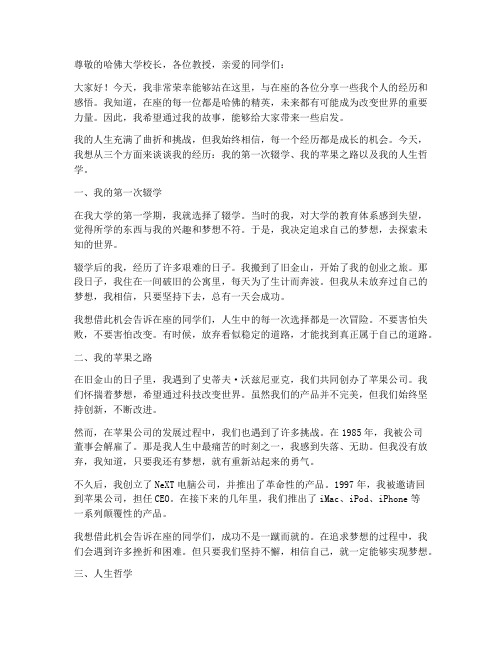
尊敬的哈佛大学校长,各位教授,亲爱的同学们:大家好!今天,我非常荣幸能够站在这里,与在座的各位分享一些我个人的经历和感悟。
我知道,在座的每一位都是哈佛的精英,未来都有可能成为改变世界的重要力量。
因此,我希望通过我的故事,能够给大家带来一些启发。
我的人生充满了曲折和挑战,但我始终相信,每一个经历都是成长的机会。
今天,我想从三个方面来谈谈我的经历:我的第一次辍学、我的苹果之路以及我的人生哲学。
一、我的第一次辍学在我大学的第一学期,我就选择了辍学。
当时的我,对大学的教育体系感到失望,觉得所学的东西与我的兴趣和梦想不符。
于是,我决定追求自己的梦想,去探索未知的世界。
辍学后的我,经历了许多艰难的日子。
我搬到了旧金山,开始了我的创业之旅。
那段日子,我住在一间破旧的公寓里,每天为了生计而奔波。
但我从未放弃过自己的梦想,我相信,只要坚持下去,总有一天会成功。
我想借此机会告诉在座的同学们,人生中的每一次选择都是一次冒险。
不要害怕失败,不要害怕改变。
有时候,放弃看似稳定的道路,才能找到真正属于自己的道路。
二、我的苹果之路在旧金山的日子里,我遇到了史蒂夫·沃兹尼亚克,我们共同创办了苹果公司。
我们怀揣着梦想,希望通过科技改变世界。
虽然我们的产品并不完美,但我们始终坚持创新,不断改进。
然而,在苹果公司的发展过程中,我们也遇到了许多挑战。
在1985年,我被公司董事会解雇了。
那是我人生中最痛苦的时刻之一,我感到失落、无助。
但我没有放弃,我知道,只要我还有梦想,就有重新站起来的勇气。
不久后,我创立了NeXT电脑公司,并推出了革命性的产品。
1997年,我被邀请回到苹果公司,担任CEO。
在接下来的几年里,我们推出了iMac、iPod、iPhone等一系列颠覆性的产品。
我想借此机会告诉在座的同学们,成功不是一蹴而就的。
在追求梦想的过程中,我们会遇到许多挫折和困难。
但只要我们坚持不懈,相信自己,就一定能够实现梦想。
三、人生哲学在我的职业生涯中,我始终坚持以下几条人生哲学:1. 追随你的内心和直觉:在你的人生中,只有你自己最了解自己的内心。
哈佛新校长大学演讲稿

大家好!非常荣幸能在这里,作为哈佛大学的新校长,发表我的就职演讲。
首先,我要感谢哈佛大学对我的信任,让我有机会为这所伟大的学府服务。
今天,我想和大家分享一些关于哈佛、关于教育、关于未来的思考。
一、哈佛的传承与使命哈佛大学成立于1636年,至今已有近400年的历史。
在这漫长的岁月里,哈佛一直秉承着“为全人类服务”的使命,培养了无数优秀的人才。
从美国独立战争时期的政治家,到现代的科技巨擘,再到各行各业的杰出代表,哈佛人都以卓越的成就为世界作出了巨大贡献。
作为哈佛校长,我深感责任重大。
我们要继续传承哈佛的优良传统,弘扬哈佛精神,让哈佛成为全球高等教育的一面旗帜。
同时,我们也要勇敢面对时代挑战,不断改革创新,为世界培养更多具有全球视野、社会责任感和创新精神的优秀人才。
二、教育的本质与未来教育,是人类文明进步的基石。
在全球化、信息化时代,教育的本质并未改变,依然是培养人才、传承文化、推动社会进步。
然而,随着科技的发展和社会的变迁,教育的内涵和外延都在不断拓展。
首先,教育要注重培养学生的综合素质。
在知识爆炸的今天,单纯追求分数已经无法满足社会需求。
我们要关注学生的身心健康、道德品质、创新能力和实践能力,培养他们成为具有全面素质的复合型人才。
其次,教育要注重培养学生的全球视野。
在全球化的背景下,各国之间的交流与合作日益紧密。
我们要让学生了解世界,关注世界,培养他们的国际视野和跨文化交流能力。
再次,教育要注重培养学生的社会责任感。
作为一名哈佛人,我们要时刻牢记社会责任,关注社会发展,为世界和平、繁荣、进步贡献自己的力量。
未来,教育将面临以下挑战:1. 技术变革带来的冲击。
人工智能、大数据等新技术的发展,将深刻改变教育的形态。
我们要积极拥抱技术,创新教育模式,让教育更加高效、个性化。
2. 全球竞争带来的压力。
各国对人才的争夺日益激烈,我们要培养具有全球竞争力的人才,为我国在国际舞台上发挥更大作用。
3. 社会问题带来的挑战。
哈佛大学经典演讲稿

尊敬的哈佛大学校长,尊敬的各位教授,亲爱的同学们:大家好!今天,我非常荣幸能够站在这里,与在座的各位分享我的一些思考和感悟。
哈佛,这座世界顶尖的学府,承载着无数人的梦想和追求。
今天,我想和大家探讨的主题是:追求卓越,铸就非凡人生。
首先,让我们回顾一下哈佛的历史。
自1636年建校以来,哈佛大学一直以其卓越的学术成就、严谨的治学态度和深厚的人文底蕴闻名于世。
从富兰克林到肯尼迪,从洛威尔到奥巴马,无数哈佛毕业生以其卓越的成就,为人类社会的发展做出了巨大的贡献。
这一切,都离不开哈佛精神——追求卓越。
那么,什么是卓越?卓越,不仅仅是指个人在学术、事业、艺术等领域取得的成就,更是一种精神境界,一种生活态度。
它是对完美的追求,是对卓越的不懈探索,是对自我超越的永不满足。
追求卓越,首先要树立正确的价值观。
哈佛大学创始人约翰·哈佛曾说:“人的一生应当这样度过:当他回首往事时,不因虚度年华而悔恨,也不因碌碌无为而羞愧。
”这句话告诉我们,人生的价值在于追求,在于创造,在于不断超越自我。
在追求卓越的道路上,我们要明确自己的目标。
目标是我们前进的动力,是我们判断成功与否的标准。
哈佛大学校训中有这样一句话:“Amic us Plato,Amator Disputandi”(我爱智慧,我爱辩论)。
这句话告诉我们,要勇于追求真理,勇于挑战权威,勇于探索未知。
为了实现卓越,我们需要付出艰辛的努力。
哈佛大学历史上有一位名叫小罗杰·巴伦的学生,他因为家庭贫困,不得不一边打工一边学习。
尽管条件艰苦,但他从未放弃过对知识的渴望。
最终,他凭借自己的努力,成为了美国历史上最年轻的诺贝尔物理学奖得主。
小罗杰·巴伦的故事告诉我们,只要心中有梦想,付出足够的努力,就一定能够实现卓越。
在追求卓越的过程中,我们要学会合作与分享。
哈佛大学强调团队合作,鼓励学生积极参与社会实践。
合作与分享,不仅能够帮助我们更好地实现个人目标,还能够促进社会的和谐与发展。
- 1、下载文档前请自行甄别文档内容的完整性,平台不提供额外的编辑、内容补充、找答案等附加服务。
- 2、"仅部分预览"的文档,不可在线预览部分如存在完整性等问题,可反馈申请退款(可完整预览的文档不适用该条件!)。
- 3、如文档侵犯您的权益,请联系客服反馈,我们会尽快为您处理(人工客服工作时间:9:00-18:30)。
哈佛大学校长就职演说:放飞我们最富挑战性的想象力2008-04-28-08-59-37 yyb350322- 阅读:216
哈佛大学校长德鲁·福斯特
郭英剑编译
转自:/show.php?id=10889 [译者按:《放飞我们最富挑战性的想象力》是美国哈佛大学第28任校长德鲁·福斯特在2007年10月12日就职典礼上的演讲词。
需要向读者说明的是,这里所谓的“编译”,是指译者删去了——也就是没有翻译——原文中的一些客套话和一些(在译者看来并不太重要的)词句,但不改动原来的句子,也就是说,这里所有的语句,都出自原文,非译者“编辑加工”后再“译”而成。
原文见:Installation address: Unleashing our most ambitious imaginings
就职演讲常常会罗列一些新校长的具体构想或是计划。
但是,当我在考虑今天意味着什么的时候,这样的罗列似乎过于束缚人,它们限制了而不是去放飞我们最富挑战性的想象力,限制了我们去思考我们最深远的责任和义务。
如果今天是超越普通日子的一天,如果今天是我们为数不多的、不仅是作为哈佛人聚集在一起、而是与一个更为广阔的学术、教学与学问的世界站在一起的一天,那么,现在就是哈佛以及像哈佛这类大学去思考的时候了:在这21世纪的第一个十年中,我们应该扮演什么样的角色。
大学的确是要承担责任的。
但我们从事高等教育的人需要首先搞清楚,我们为了什么去承担责任。
人们要求我们报告毕业率、研究生院的入
学统计数字、标准考试的分数,目的是为了在大学评价中提高“附加值”,人们要看研究经费有多少,教师出版和发表论著的数量是多少。
但这些硬性指标本身并不能说明所取得的成就,更不要提大学所渴望达到的目标了。
虽然了解上述指标很重要,它们也可以说明我们事业中一些特别的部分内容。
但我们的目的要比这些宏大得多,因此,要解释我们的责任感,也更加困难。
那么,让我斗胆提出一个定义来吧。
一所大学的精神所在,是它要特别对历史和未来负责——而不单单或着仅仅是对现在负责。
一所大学关乎学问(learning),影响终生的学问,将传统传承千年的学问,创造未来的学问。
一所大学,既要回头看,也要向前看,其看的方法必须——也应该——与大众当下所关心的或是所要求的相对立。
大学是要对永恒做出承诺,而这些投资会产生我们无法预测且常常是无法衡量的收益。
大学是那些活生生的传统的管理员——在Widener图书馆与Houghton图书馆以及我们另外的88个图书馆,在Fogg与Peabody博物馆,在我们的古典学科的系科,在历史与文学的系科,都有活生生的传统。
对于那些努力去证明这些传统不过是工具性的、不过是对某些当代需求有一定用处而已的说法和作法,我们会感觉很不舒服。
恰恰相反,我们追寻传统,从某种程度上讲,是“为了它们自身”,因为正是它们,千百年来界定了我们何以为人类,而不是因为它们可以提升我们在全球的竞争力。
我们追寻它们,因为它们使我们的——无论是个人的还是社会的——洞察力增加了深度和广度,而这,则是我们在难以避免短视的当下所无法发现的。
我们同样追寻它们,也因为正如我们需要食物和房屋生存一样,
正如我们需要工作和寻求教育来改善我们的运气一样,我们作为人类同样需要寻找意义。
我们努力去理解我们是谁,从哪里来,到哪里去,原因何在。
对许多人来说,四年的大学生活不过是允许自己去自由自在地探索这类根本问题的一个插曲而已。
但对意义的找寻,是没有尽头的探索,它在不断地阐释,不断地干扰和重新阐释现状,不断地在看,从不会满足于已有的发现。
事实上,这就是所有学问的真谛,自然科学、社会科学和人文学科,概莫能外,因此,它也就成为了“大学是干什么的”之核心所在了。
就其本质而言,大学培育的是一种变化的文化甚至是无法控制的文化。
这是大学为未来承担责任的核心。
教育、研究、教学常常都是有关变化的——当人们学习时,它改变了个人;当我们的疑问改变我们对世界的看法时,它改变了世界;当我们的知识运用到政策之中时,它改变了社会。
知识的扩充就意味着变化。
但变化常常使人感到不舒服,因为它在你得到的同时也会失去,在你发现的同时也会迷失方向。
然而,当面对未来时,大学必须去拥抱那不稳定的变化,它对人类理解世界的每一点进步都至关重要。
我们对未来的责任还对我们提出了更多的要求。
大学既是哲学家也是科学家的所在地,这是独一无二的。
对未来承担责任要求我们,要跨越地理与智力的界限。
正如我们生活在田野与学科正在缩小差距的时代,我们所居住的是一个逐渐跨越国家的世界,在这个世界里,知识本身就是最有力的连接体。
真理是渴望达到的目标,而不是占有物。
而在这其中,我们——和所有以思考和自由询问精神显示其特色的大学一道——向那些拥抱不容争
辩的确定性的人们提出挑战乃至是提出警告。
我们必须将自己置于不断质疑(doubt)这种令人不舒服的状态,使自己保持谦逊的态度,不断地相信:还有更多的知识需要我们去了解、更多的知识需要我们去讲授、更多的知识需要我们去理解。
上述所承担的种种责任既代表着一种特权,也代表着一种责任。
我们能够生活在哈佛这样一个理性自由、传统激扬、资源非凡的王国,因为我们正是被称为是“大学”的这样好奇而神圣的组织的一部分。
我们需要更好地去理解和推进大学的目的——不单单是向总持批评立场的公众加以解释,更要为了我们自身的价值而坚持自我。
我们必须要付诸行动,不仅是作为学生和教工、历史学家和计算机科学家、律师和医生,语言学家和社会学家,更是作为大学中的成员,我们对这个思想共同体负有责任。
我们必须把彼此看作是相互负有责任的,因为由我们所组成的这个组织,反过来界定了我们的潜在价值。
对未来承担责任包含着我们对学生所承担的特殊职责,因为他们是我们最重要的目的和财产。
想要说服一个国家或是世界去尊重——不要说去支持了——那些致力于挑战社会最根本的思维设定,这很不容易。
但这,恰恰就是我们的责任:我们既要去解释我们的目的,也要很好地去达到我们的目的,这就是我们这些大学在这个新的世纪生存和繁荣的价值所在。
哈佛大学不能孤独地为此奋斗。
但我们所有人都知道,哈佛在其中扮演着特殊的角色。
这就是我们今天在这里的原因,这就是她对我们意味深长的原因。
上一周,我拿到一个深黄褐色的信封,它是在1951年由哈佛的第23任校长詹姆斯·柯南特(James B. Conant)委托给哈佛档案馆保存下来
的。
他在留下的简短说明上称,请下一世纪开始时而“不是之前的”哈佛校长打开它。
我撕开了这封神秘信件的封口,发现里面是我的前任留下的一封不同寻常的信。
它的抬头是“我亲爱的先生。
”柯南特写作时给人一种危险迫在眉睫的感觉。
他担心第三次世界大战一触即发,这将“很有可能使我们所居住的城市包括剑桥在内遭到破坏。
”
“我们都想知道,”他继续写到,“自由世界在未来的50年里会如何发展。
”但是,当他想象哈佛的未来时,柯南特就由不详之兆转向了坚定的信念。
如果“厄运的预言”证明了是错的,如果有一位哈佛校长能活着读到这封信,那么,柯南特就对哈佛的未来有信心。
“你会收到这封信,会带领一个比我荣幸地执掌时更加繁荣、更有影响的大学。
……[哈佛]将坚持学术自由、容忍异端的传统,我确信是如此。
”我们必须致力于此,确信他在未来也是正确的,我们必须共同拥有和支持他的这种信念。
柯南特的信,就像我们今天在此聚会一样,标志着在过去与未来之间,有一块引人注目的交汇地。
在这个仪式上,我接受了我对他来自历史的声音所祈求的传统应付的责任。
与此同时,我也与你们大家一道,确认了我对哈佛现在和未来的责任。
正如柯南特所处的时代一样,我们也处于一个使我们有充足的理由忧虑不安的世界,我们面对的是不确定。
但我们同样要对这所大学的目的和潜在发展保持一种不可动摇的信念,她终究会尽其所能地去设计从现在起之后的半个世纪内世界将会怎样。
让我们拥抱那些责任和各种可能性吧;让我们分享它们“紧密相联……如一体;”让我们开心地去从事这项工作吧,因为这样的一项任务是一种难以衡量的特权。
希望以上资料对你有所帮助,附励志名言3条:
1、常自认为是福薄的人,任何不好的事情发生都合情合理,有这样平常心态,将会战胜很多困难。
2、君子之交淡如水,要有好脾气和仁义广结好缘,多结识良友,那是积蓄无形资产。
很多成功就是来源于无形资产。
3、一棵大树经过一场雨之后倒了下来,原来是根基短浅。
我们做任何事都要打好基础,才能坚固不倒。
